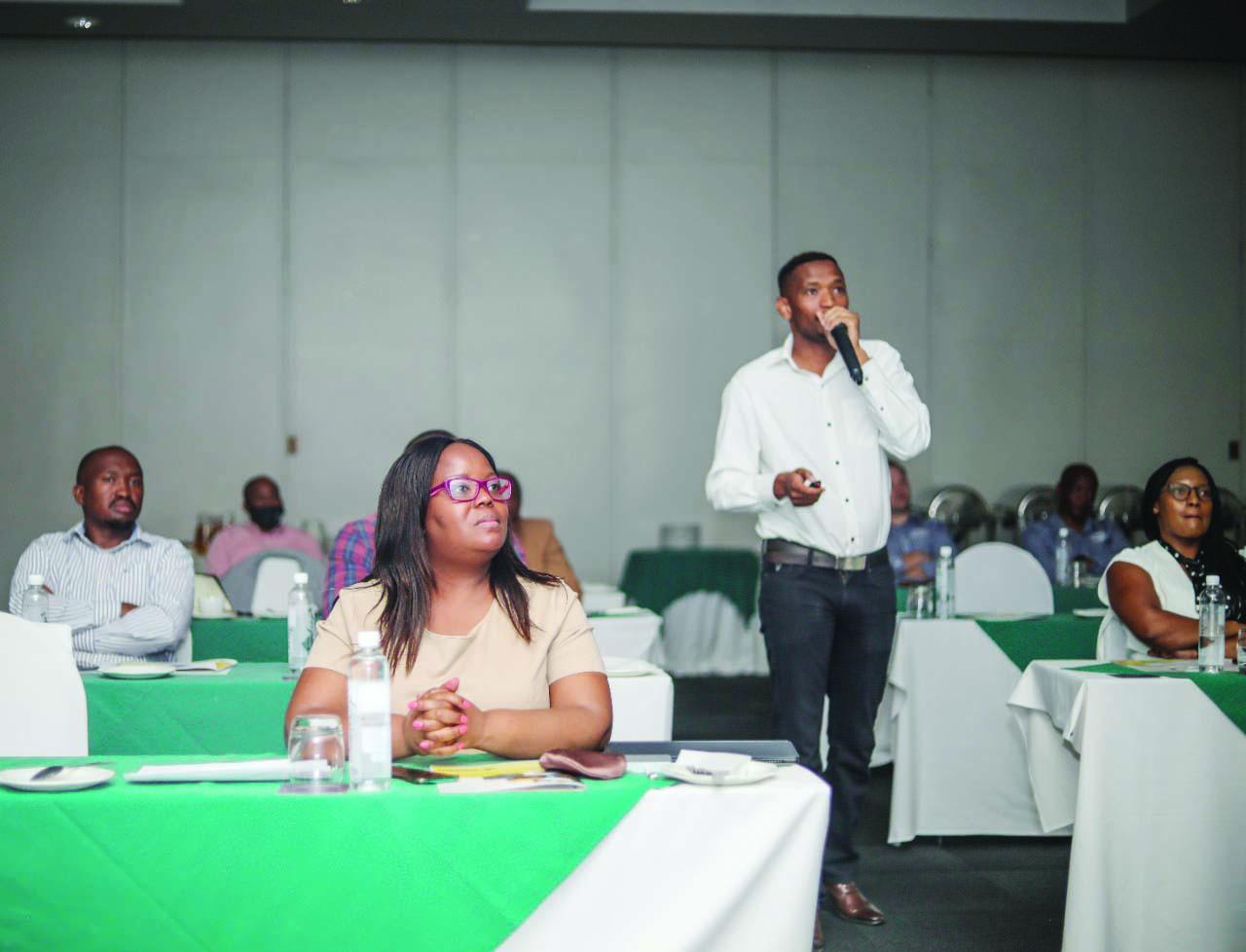Africa-Press – Lesotho. The Chief Executive of the Basotho Enterprise Development Corporation (BEDCO) IDIA PENANE (IP) is twelve months in the job after her appointment in in February last year.
Public Eye reporter MATHATISI SEBUSI (PE) engaged the former Lesotho Revenue Authority Chief Planning and Modernisation officer to find out how far she has gone in turning the corporation around as she promised on assuming office.
PE: BEDCO has been mandated to establish, develop, and grow Basotho enterprises, how have you actualised this instruction?
IP:
The corporation fulfills this mandate through facilitating the establishment, development and growth of micro, small and medium businesses (MSMEs). Strategies towards doing this include capacitation and provision of business advisory services to MSMEs and incubation services, which we have recently improved with the assistance of the African Development Bank (AfDB), under a project called Promoting Entrepreneurship Development.
This improvement will enable getting private sector involvement in the incubation process through the establishment of private incubators. We facilitate access to finance, which we implement through business plan competition appraisals; we also have competitions for sound business plans where we provide seed capital to start-up businesses.
This financial year we are also looking at exploring additional funding mechanisms for MSMEs, leveraging on our relationships with the private sector and key stakeholders in the development of the MSME sector.
BEDCO facilitates access to markets, which we have historically done through flea markets, EXPOs and exposing some of our MSMEs to international trade fairs while also promoting an entrepreneurial culture in the country. This we do through collaborations and engaging with high school students.
This year we have gone a step further to engage a behavioural science specialist to help us design a survey that will help us understand some of the inhibitors to entrepreneurship, which are unique to Basotho so that our interventions can be more effective.
PE: In the past year, your corporation commenced an African Development Bank-funded assessment project to position itself towards fulfillment of its mandate.
What key issues came out to inform your operations going forward?
IP:
The major realisation that came out of this exercise was that, unfortunately, BEDCO seems not to have lived up to its mandate as expected. Among several issues that had been identified and have led to this observation includes limited strategic thinking and direction.
Inadequate finances, which have declined over time, was also an issue. Remember BEDCO is partially funded by the government to run its operations and generates income from the commercial property that it rents outs.
The overall income has declined over time due to a decline in government revenue which we all know about, as well as challenges in effectively managing rent collection.
There was also a lack of focus in the efforts towards assisting MSMEs. For instance, some of the programmes that were started were abandoned before they were able to meet their objectives. In addition some of the services provided have been very basic and not effectively managed.
This assessment also established skills gaps which have largely been caused by the financial challenges I have mentioned, and these resulted in our inability to attract and retain the best skills and to also capacitate staff.
There has also been limited collaboration with stakeholders towards carrying out our mandate. We have been very deliberate about ensuring that these issues are resolved and we will be commencing the implementation of most of the recommendations in the new financial year.
These include the introduction of a more robust performance management system, the roll-out of a culture change programme, the introduction of a project and change management capability to ensure execution and leadership capacitation and automation. The AfDB has fortunately agreed to support us in this implementation as well.
PE: Which stakeholder did you bring on board, and what was their contribution and feedback?
IP:
Various stakeholders were interviewed covering both the private and public sectors. The general feedback from them was that there is need for a government institution such as BEDCO, even though a lot of work needs to be done in transforming it towards effectively achieving its mandate.
PE: And how do you think what came out of this exercise will impact on how you deliver services and contribute to the country’s economic development?
IP:
We have used the results of this exercise to develop our new strategic plan and a new business model which focuses on us re-positioning ourselves to better fulfil our mandate and to positively contribute to Lesotho’s economic development.
This means the way we deliver our services will drastically change particularly responding to government priorities. One of the opportunities that our strategy aims to leverage on is collaboration, whereby we plan to deliver a lot of our services through partnerships.
We have also recognised that there are drastic behavioural changes that need to be made to make this a reality. One of these changes that I have started seeing a lot of over the past couple of months is an increased level of commitment amongst the BEDCO staff.
I have started seeing people work based on delivery instead of hours. We still have a long way to go but these are some of the small improvements that will go a long way in improving our service.
PE: There is also talk of a new five-year strategic plan, have previous strategic plans achieved what they were intended to do? If not, why and what have you learned?
IP:
Since I am new in the corporation, I would like to refrain from answering this one. What I can, however, say is that we have tried to provide more focus on our new strategic plan and alignment with the National Strategic Development Plan (NSDP) II.
PE: Would you confidently say BEDCO is and operates like a 21st century organisation modelled on the business needs of the time?
IP:
The AfDB project was aimed at addressing this very issue. Our new vision talks to being a progressive organisation which can adapt to the rapidly changing requirements of the environment in which we operate. For example, during this COVID-19 pandemic, our incubation services will address this in offering online services to MSMEs.
PE: How does the corporation fit into the larger national economic policy frameworks such as the NSDP, and what programmes and projects can you point to in indicating how you contribute?
IP:
The very core mandate of BEDCO talks to the first key priority is of the NSDP II which is that of “Enhancing inclusive and sustainable economic growth and private sector job creation.
If one looks at the reality that MSMEs create close to 70 percent of all jobs, this gives credence to the primacy of MSMEs as the backbone of economic development of Lesotho, hence government’s emphasis on private sector development.
PE: How do you assist MSMEs to focus on these national economic policy priorities?
IP:
As I have indicated earlier, in our interventions, which are outlined in our Strategic Plan 2020-2025, we have identified five key focus areas. One is the core of enterprise development with other four being supportive measures to achieve the core mandate.
We incubate and capacitate MSMEs with relevant skills. We also promote a culture of entrepreneurship among Basotho so that we create a nation that is enterprise-savvy. The direction of the world economy is towards enterprise; it is no longer dependent on Foreign Direct Investments and balances of payments.
PE: We believe enterprise development should be your priority area.
As a factor directly talking to your mandate, would you agree with the general perception that BEDCO has degenerated into a property manager rather than this core mandate of enterprise development?
IP:
I have been responsible for strategic planning and resource allocation for several years in my previous career life and one of the things that this has taught me is that no matter how much we can plan to achieve and strive to meet our respective mandates, resources will always be a hindrance.
Before I joined BEDCO I was convinced that in my first year I would radically move the organisation towards fulfilling its mandate. This desire was, unfortunately, quickly dampened by the realisation that the organisation is in deep financial challenges that inhibit its ability to fulfil its mandate and threaten its very existence.
We all know the situation that the government of Lesotho is in with regards to revenues and the expectation is that some parastatals can source other income generation streams to ease the burden on government while being able to effectively carry out its mandate.
As you have rightfully said, BEDCO’s mandate is not to collect rent, and that is not where the focus should be. I suspect the organisation has, however, found itself in this situation due to the financial constraints it faced.
We have changed this and at the executive level ensure that focus is on enterprise development while also ensuring that we are able to generate enough income to fulfil this mandate.
PE: As a follow-up and to invalidate detractors, what service delivery initiatives can you point to indicating BEDCO is actually aware and attends to the array of challenges encountered by MSMEs?
IP: On top of several I have already pointed to, we have also implemented a first of its kind virtual expo in Lesotho as a means to expose and engage MSMEs and the nation at large, partly addressing the access to markets for MSMEs and also as an information sharing platform through webinars.
PE: Do you facilitate MSME to MSME value chain linkages to ensure their long-term sustenance?
IP:
We have recently developed an elaborate access to markets strategy which responds to a survey that was carried out a while back showing that while Basotho MSMEs have market coverage in terms of selling to individuals, there is room to improve business linkages.
Our strategy looks at creating linkages with other MSMEs, large businesses and government, and looking at exposing our MSMEs to international markets.
We are already in discussions with some potential large business off-takers and one of the major inhibitors in the success of this has been identified as quality and quantity.
This has informed some of the capacitation programs that we will be doing in the next financial year to ensure that we can effectively create these business linkages.
PE: Looking into the future, what engagements do you have with sister organisations, parastatals or the private sector to ensure your efforts reach a wider MSME population?
IP:
In November last year we commenced engagements whereby we communicated our strategy to a variety of stakeholders. Some of the first stakeholders that we commenced with were our sister organisations and the private sector.
We did this because as I mentioned earlier, we recognise collaborations as a key leverage. These sessions ignited a lot of excitement and commitment to collaborate. We are in discussions with some of them and will be enhancing these efforts in the coming months to look at areas of collaboration.
PE: When talking to BEDCO’s vision you oftentimes refer to an age-old Sesotho axiom
‘Kopano ke matla’, can you point to tangible outputs achieved that can be presented as success stories?
IP:
I am sure you are aware of the ‘Bacha Entrepreneurship Programme’ which is a collaboration between us, the Standard Lesotho Bank and the Lesotho Revenue Authority.
This programme has provided seed capital, capacitation, and incubation services to 17 Basotho youth-owned businesses. This is just but one of the examples where we have held hands to help our MSMEs.
PE: Where has the emergence of the Coronavirus and its impact on nations’ economies place BEDCO’s plans and efforts?
IP:
The role of BEDCO has never become as relevant as now with the COVID-19 pandemic and its unfortunate effects on the economy. Our MSMEs have been hit the most because of the previous lockdown and the one that we are in now.
We have developed our plans to respond to how we can assist our MSMEs and the general recovery of our economy. Some of these interventions will include sourcing for and helping them access funding in various ways; providing them with advisory services in response to their challenges and helping them with access to markets.
BEDCOs overall existence is to always assist MSMEs. This is even greater during this tragic period and we urge the nation at large to support our initiatives to rescue and support the MSME sector as it is the hardest hit by the lockdowns during this pandemic.
For More News And Analysis About Lesotho Follow Africa-Press






